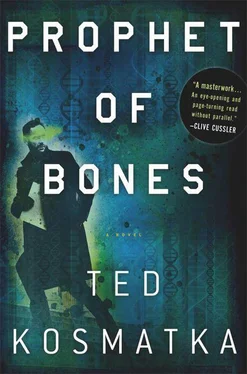“That’s bullshit,” she snapped. “You think because—”
“Your gender has nothing to do with it, I assure you,” Gavin said. “You have the bone. It’s as simple as that.”
Lilli looked skeptical.
“It’s our leverage here. Someone has to stay back.”
“What about him?” Lilli asked, gesturing to Paul.
“They already know about him. Mentioned him by name, in fact—remember?”
Paul raised his hand to shield his gaze from the sun and looked out toward the pier. “This congressman of yours seems particularly well informed,” he said.
“And what if things go badly?” Lilli asked.
“Then you coming along certainly wouldn’t help. In fact, it would be even worse, because then the bone would be compromised. You’re our insurance policy.”
Gavin tossed Lilli the keys. “If there’s a problem, don’t hesitate. Just go.”
Paul and Gavin climbed up onto the sand. Just over the rise, people played volleyball and lounged in the sun. Two teenagers tossed a football back and forth, while children seemed to run everywhere. Lifeguards sat on huge white chairs, surveying it all with an air of casual disinterest. Paul saw the water—children splashing in the shallows, toddlers sitting at the waterline with their mothers.
Paul and Gavin veered to the left as they trudged through the loose sand, walking until they eventually came to the edge of a low cement walkway. The long sidewalk ran parallel to the beach, extending for a hundred yards before ending at a short stairway that led up to the pier. The pier was weathered old concrete, ten feet wide, jutting a quarter mile out into the lake.
“Do you see them?” Gavin asked as they walked.
Paul nodded.
There were already men in position. It was easy to pick them out once you knew they were there. A man in a sport jacket and a baseball hat, sitting on the low cement wall. Another man leaned with his back against a pavilion, casually reading a newspaper. A third man, standing on the beach, gazed out at the water. His hand rose to his ear for a moment, and his lips moved. That one wasn’t even trying to be inconspicuous. He was the one they were supposed to see.
Halfway to the pier, they passed another man. This one was sitting with his legs draped off the side of the walkway, flip-flops dangling from his feet. Paul wasn’t sure about him.
And past them all, up ahead, standing alone on the pier, casting a line out into the water, was a lone fisherman.
Paul and Gavin climbed the six steps up to the pier.
Even from a distance, Paul knew it was him. He might have recognized the man from pictures, or maybe it was something in his stance. Like he was waiting. He was in his mid-fifties, tall, and stocky without being fat. He wore a fisherman’s cap and a fisherman’s vest. A bright orange tackle box sat next to him on the pier. He was halfway out on the pier, an eighth of a mile from the beach. Plenty of time to see people coming. Plenty of privacy from prying ears. It took them a full three minutes to walk out to him.
As Paul and Gavin approached, the fisherman glanced briefly in their direction, then threw a long cast out onto the water.
“Not so much as a nibble yet,” the man said as Gavin and Paul closed the distance.
“Sorry to hear that,” Gavin said.
“Well, what’s the old saying? That’s why they call it fishing, not catching.”
“Congressman Lacefield, I presume?”
The man responded with the slightest nod while reeling in his line.
“This is Paul,” Gavin said.
“I know who he is,” the congressman said curtly. “Grab a pole, the both of you.”
That’s when Paul noticed two poles lying along the cement, wedged against the riser that ran the length of the pier. He picked up both and passed one to Gavin. The one Paul kept for himself was slightly larger, an open-face reel, cork handle. It gleamed. It was probably ten times more expensive than any fishing pole he’d ever held.
He checked the lure. Green spinner bait. He thought of lures dangling over ice but pushed the thought away.
“So this is some serious business you find yourselves in,” the congressman said.
“Serious business,” Gavin agreed.
“I’ve been in politics for twenty years now. I’ve seen other politicians come and go. Some voted out. Some sent to jail. Over the years, I’ve even seen one or two die under less than clear circumstances. Yet I remain. Do you know how I’ve managed to do that?”
“I wouldn’t presume to guess.”
“I stay out of serious business. I see serious business coming, and I step aside, and I let it pass. Live to fight another day.”
“Yet here you are,” Gavin said. “Out here fishing.”
“Against my own better judgment, yes. And against all counsel. Here I am on this fine, clear day, drowning worms off this pier.” He swung his arm back and threw a long cast out into the choppy water. The lure made a splash and then disappeared. He reeled it in slow and steady, the line carving a slight ripple on the water. “The thing about fishing, though. If I hit a snag, I can cut bait anytime.”
Gavin considered this. “Fair enough,” he said.
“So I hear you have information for me.”
“We do. We think you’ll find it interesting.”
“I’m interested in a lot of things. And while I’m always keen to keep my ears open, there is an important distinction between information that is interesting and information that is useful. I trust you understand this distinction.”
“Information is information. What you do with it is up to you.”
“Spoken like a man who knows that his information is useful. Convince me.”
“Martial is a thorn in your side.”
“True.” The congressman took a breath and released it slowly, the long sigh of resignation—like a middle school teacher about to discuss his most difficult student. “Martial is a difficult man. A driven man.”
“And you want him neutralized.”
“I stay out of his way.”
“That’s not what I understand.”
“When I can, I stay out of his way. Lord knows he doesn’t make it easy. Our constituencies are at odds, it seems. I have friends who would like nothing more than to see Martial taken down.”
“Martial is behind a series of murders and cover-ups that stretch back over a period of years.”
“I’m afraid that if Martial could be neutralized for something as simple as a few murders, it would have happened a long time ago.”
“The cover-ups are scientific in nature. He’s covering up the discoveries of new bones. Suppressing the release of new research.”
The congressman frowned. “You tell me things I already know. So this is what you come to me with? Rumors?”
“And there are things going on at the compound. Experiments that would never be sanctioned—”
“Speculation. Sensationalism.”
“Facts.”
“Facts.” The congressman spit the word with contempt. “I’m a lawyer by training; perhaps you weren’t aware.”
Gavin shook his head.
“Before politics I spent ten years as a trial lawyer, and even I can’t tell you what a fact is, exactly. The more time I spent in law, the more malleable that term became. Facts change with the telling. Squeeze a fact hard enough, and it’ll change shape in your hand. Facts don’t mean anything.”
“Proof, then.”
The congressman raised an eyebrow. “Proof,” he said, “is an altogether different animal.”
Gavin cast his line out on the water. In the distance, a powerboat rumbled a slow arc across the water. It was the second time the boat had made that exact pass, a half mile out from the pier. Paul could see two men on board. It occurred to Paul that this boat, too, might belong to the congressman. He wondered how many eyes were trained on them right now.
Читать дальше












